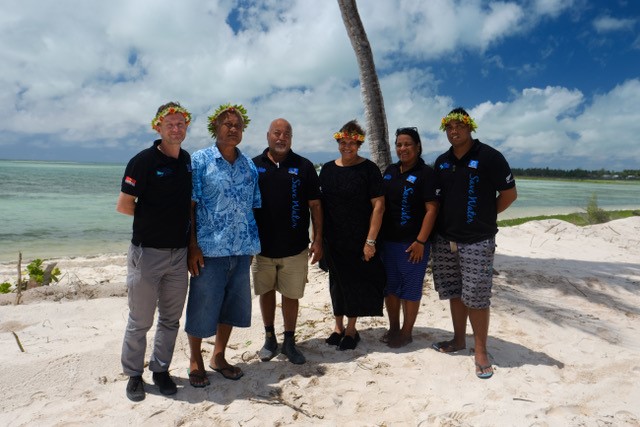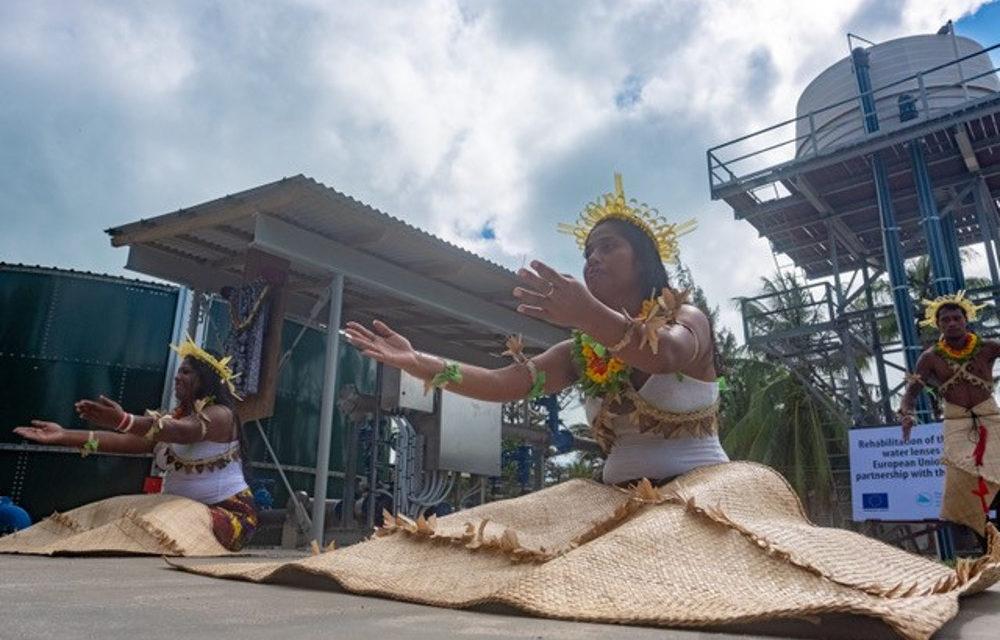Photo: traditional dancing at the opening of the water infrastructure
New water and electricity supply schemes have been officially opened on Kiritimati Island, providing greener energy sources and improving access to clean drinking water for the local hospital and more than 400 households in the communities of Tennessee and Ronton.
The upgrade of the Decca to London water supply system, which was funded by the European Union and the government of New Zealand, in partnership with the Government of Kiribati and Pacific Community (SPC), is part of a joint effort to bring secure safe and sustainable water supply for Kiritimati communities and increase economic development of the Island.
The water supply system incorporates the construction of three new infiltration galleries at the Decca groundwater reserve, twelve new solar pumping systems, a disinfection system, 250 thousand litres of water storage, and 4 km of pipeline connecting the improved supply to residents in Tennessee and London.
During the opening ceremony, the Kiritimati Island Energy Sector Programme also unveiled two new power stations, a solar farm and over 23 km of overhead electricity lines interconnecting the major population centres. The new power system will reduce reliance on diesel fuel, reduce operating costs and improve access to reliable electricity services to businesses and residential consumers.
Speaking at the event, Kiribati Minister for Finance, the Hon. Dr Teuea Toatu, highlighted the importance of investment in energy and water sectors. “This is critical infrastructure for Kiribati, with the resulting improvements cross-cutting to other sectors to support the overall development of Kiritimati Island,” he said. “Both projects are consistent with Government policy to develop Kiritimati as a growth centre and, with the right management and maintenance programmes in place, the knowledge, capacity and infrastructure built through these projects should support local livelihoods well into the future”.
The works were supported by the Ministry of Line and Phoenix Islands Development, the lead implementing agency. Minister of Line and Phoenix Islands Development, the Hon. Makarite Temari, highlighted the improvements achieved, and emphasised Government’s on-going commitment to the implementation of the Line and Phoenix Islands Integrated Development Strategy and Kiribati Vision-20. “Despite many challenges we have managed to complete the major upgrade of the electricity and water supply infrastructure,” he said. “Water pumped from the Decca water lens has doubled to around 260 thousand litres per day, and the increased supply is now benefiting users at the end of the system, including our hospital,”. He further added “the new electricity infrastructure will provide a strong backbone for meeting the energy needs for future development of the island”.
Present at the launch, the European Union representative Marta Brignone said, ‘through crucial investments in water and energy and the good collaboration amongst the different partners, we have established a strong central basis for Kiritimati further development. While the contractors have finished their construction roles, there is still important work to be done by the Government of Kiribati particularly in energy, water and sanitation, in order to ensure long-term sustainability and future adequate investments in the Island. The EU stands with Government of Kiribati to support the inclusive and sustainable socio-economic development of Kiritimati and will continue working closely with the line ministries under the 11th European Development Fund.
Speaking on behalf of the New Zealand Government, Nigel Ewels, highlighted his counties commitment Kiritimati Island’s development, especially in improving the delivery of such basic needs as reliable power and water. He stressed the importance of implementing the system’s Asset Management Plan to ensure the ongoing sustainability of the infrastructure.
SPC’s Deputy Director General, Audrey Aumua, noted the importance of sustainable water management in supporting the resilience of Kiritimati Island communities. “With rainfall amongst the most variable in the Pacific, Kiritimati Island’s shallow groundwater reserves act as lifelines against the impacts of drought and climate change,” she said. “I’m encouraged to see first hand the commitment of Government and the Kiritimati community to the on-going monitoring of these reserves, ensuring that their management is sustainable and informed by sound science.”
The Kiritimati Island Water Project and the Kiritimati Island Energy Sector Programme have a combined budget of Euro 13 million with the major infrastructure upgrade completed in March 2018.

Audrey Aumua, SPC DDG with SPC project manager George Beck, and with the SPC project team
